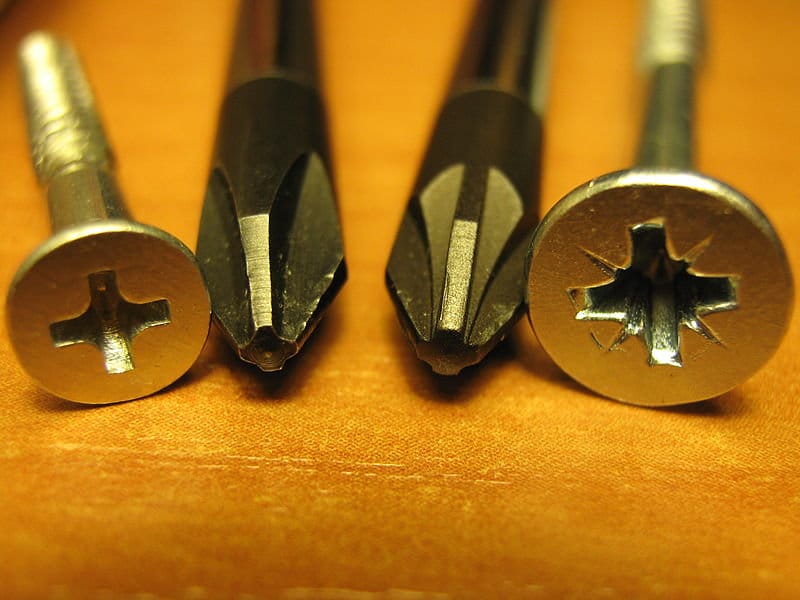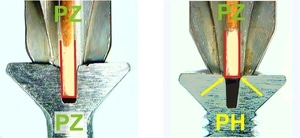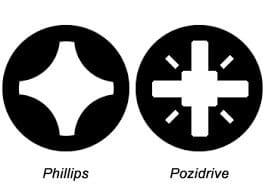Pozidriv vs Phillips
Have you ever tried to use a ‘crosshead’ screwdriver on a crosshead screw and found that, to your frustration, the screwdriver is slipping?
The reason could be because there are two different types of crosshead screws that look similar, but are actually different. The two types are the Pozidriv and the Phillips.
So what’s the difference between them?

The Phillips Drive

- Patented in 1936
- An improvement upon slotted drives
- Reduction in cam-out
- Tapered flutes
- Manufactured by punching
Introduced as an improvement on the widely-used flat head drive, the Phillips drive, invented by Portland mechanic John Thompson but named for its legal owner, Henry Phillips, was one of the first attempts to improve upon the basic, yet flawed, flat head formula. Slotted drives were used in the vast majority of contemporary screw designs, but tended to slip from the open ends during installation, were difficult to align, and the slot required a closely matching bit to install. The cruciform design of the Phillips drive attempted to remedy these issues.
The Pozi Drive

- Patented in 1963
- Improvement upon Phillips drives
- Further reduction in cam-out
- Parallel flutes
- Improved manufacture by punching
The Pozi drive, often known by its trade name, Pozidriv, or misspelled as Posi, Posidriv, or Posidrive, was patented in 1963 as an improvement upon the Phillips Drive, which was, itself, an improvement upon the archaic slotted recess. Arguably, the most significant and visually obvious feature of the Pozi drive is the addition of four equiangular, equidistant “wings” incorporated into the original cruciform design, but several other features, including a redesigned head shape, give the Pozi the edge over Phillips drives in many applications.
Comparison Chart for different drives
| Head Type | Slotted Head | Phillips Head | Pozi Head |
|---|---|---|---|
| When was it invented? | Invented pre-1600 | Invented 1934 | Invented 1959 |
| Why was it invented? | Basic drive | An improvement upon slotted drive | An improvement upon Phillips drive |
| What is the drive shape? | One slot | Four radial slots | Eight radial slots |
| How is it located? | Manual alignment | Self-centralizing | Self-centralizing |
| Will it cam-out? | Susceptible to cam-out | Slight resistance to cam-out | Improved resistance to cam-out |
| What is the tip shape? | Flat tip | Angular tip | Shallow angular tip |
| How many flutes? | No Flutes | Tapered flutes | Parallel flutes |
| How is it manufactured? | Manufactured by broaching | Manufactured by punch | Manufactured by punch, and resistant to metal fall-away |
The difference between Pozidriv vs Phillips
This image shows the subtle difference between a Phillips and a Pozidriv screw head.
Phillips screw heads are designed so that the screwdriver will cam out (slip) if too much torque (power) is applied. The reason is that this prevents the risk of the screw head being twisted off by a power tool. This can be helpful because if the head breaks off, a screw is very difficult to move.
Pozidriv screws, on the other hand, are designed specifically so that the screwdriver head does not cam out.
Phillips screwdrivers fit in Pozidriv screws and can turn them. However, they are liable to slippage and can damage the screw.

Pozidriv screwdrivers, on the other hand, do not fit Phillip’s heads. If you try, you’ll probably fail, and you’ll probably damage your screw.

How to instantly identify a Pozidriv vs Phillips screw head
The easiest way to know whether a screw is Phillips or Pozidriv is that all Pozidriv screws have lines etched the screw head in-between the four arms of the cross. This visual aid means that you can instantly recognize whether a screw is a Pozidriv or not.

Conclusion
Pozidriv vs Phillips – To prevent slippage and damaging of screws, you should only use a Phillips head screwdriver on a Phillips head screw, and you should only use a Pozidriv screwdriver on a Pozidriv screw.
To know more about different types of screw drives visit Wikipedia
Browse the different categories of screws we stock click here
